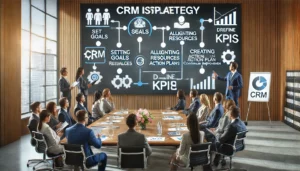CRM Systems and Strategies: The Ultimate Guide to Maximising Customer Relationships

Customer Relationship Management (CRM) is a vital component of any successful business. It encompasses the technology, strategies, and practices that enable businesses to manage and nurture relationships with their customers. This guide will walk you through the fundamental concepts and best practices of CRM, helping you maximise customer engagement and retention, and ultimately propel your brand towards success. Learn more about CRM from PPC Geeks – the best PPC ad agency in the UK.
Key Takeaways
- Understand the core functions of CRM systems to improve customer interactions and data management.
- Implement effective CRM strategies to drive business growth and overcome common challenges.
- Enhance sales processes by automating workflows, tracking performance, and managing leads.
- Optimise marketing campaigns by personalising efforts, utilising analytics, and integrating automation tools.
- Choose the right CRM for your business by considering key factors, comparing popular solutions, and customising to fit your needs.
Understanding the Core Functions of CRM Systems
Key Features of Modern CRM Systems
At the core of CRM software is a centralised database that allows teams across different departments to access up-to-date information about customers at any time. Armed with this comprehensive view of a customer’s journey with the product or brand, organisations can tailor their interactions for more personalised experiences. CRM is an essential tool for businesses of all sizes. By understanding how it works and how to use it to your advantage, you can improve your customer service and drive more sales.
How CRM Systems Improve Customer Interactions
Customer Relationship Management (CRM) is a vital component of any successful business. It encompasses the technology, strategies, and practices that enable businesses to manage and nurture relationships with their customers. It acts as a central hub for storing customer data, tracking interactions, and providing insights into customer behaviour. But CRM is far more than just a database. It is the secret weapon that fuels successful sales strategies. Think of it as a compass that guides your sales team through a labyrinth of leads, prospects, and customers.
The Importance of Data Management in CRM
Definition and History:
Customer Relationship Management is defined as a system or approach that allows businesses to effectively manage relationships and interactions with customers through the use of data and technology. It involves gathering and analysing customer information, tracking customer interactions, and implementing strategies to enhance customer satisfaction and loyalty. Effective data management within a CRM system ensures that all customer information is accurate, up-to-date, and easily accessible, which is crucial for making informed business decisions.
Implementing Customer Relationship Management Strategies for Business Growth
Implementing a Customer Relationship Management system is not just about adopting software; it requires a customer-centric mindset and a commitment to continuously improving customer relationships. By leveraging CRM, businesses can gain valuable insights, make data-driven decisions, and build customer loyalty, ultimately driving revenue growth.
Steps to Successful CRM Implementation
Setting goals and creating an action plan for CRM implementation:
- Define specific and measurable goals for CRM implementation.
- Identify the necessary resources, both financial and human, to support CRM implementation.
- Create a timeline and action plan for implementing the CRM system.
- Establish key performance indicators (KPIs) to measure the success of implementation.
Common Challenges and How to Overcome Them
- Resistance to Change: Employees may resist new systems. Provide adequate training and communicate the benefits clearly.
- Data Quality Issues: Ensure data is clean and well-organised before migration.
- Integration with Existing Systems: Plan for seamless integration to avoid disruptions.
- Continuous Improvement: Regularly review and refine your CRM strategy based on feedback and performance metrics.
Measuring the Success of CRM Strategies
To measure the success of your Customer Relationship Management strategies, track key performance indicators (KPIs) such as customer retention rates, sales growth, and customer satisfaction scores. Use these insights to make necessary adjustments to your CRM strategies. This could involve refining your marketing campaigns, streamlining sales processes, or enhancing customer service initiatives.
Iterative improvements and continuous enhancement of CRM strategy are crucial. Regularly review and evaluate the effectiveness of the CRM strategy, collect feedback from users and stakeholders, and stay up-to-date with industry trends.
Enhancing Sales Processes with Customer Relationship Management
Automating Sales Workflows
Automating sales workflows is a game-changer for any sales team. By leveraging Customer Relationship Management systems, you can automate repetitive tasks such as data entry, follow-up reminders, and email campaigns. This not only saves time but also ensures consistency and accuracy in your sales processes. Automated reminders and notifications ensure timely follow-ups, increasing the chances of conversion. Additionally, automation allows your sales team to focus on high-value activities like building relationships and closing deals.
Tracking Sales Performance
Tracking sales performance is crucial for understanding the effectiveness of your sales strategies. CRM systems provide valuable insights into key performance indicators (KPIs) such as conversion rates, sales cycle length, and revenue generated. With this data, you can identify trends, pinpoint areas for improvement, and make data-driven decisions. A well-implemented CRM system offers customisable dashboards and reports, making it easier to monitor your sales team’s performance in real time.
Leveraging CRM for Lead Management
Effective lead management is essential for maintaining a healthy sales pipeline. CRM systems enable you to capture, track, and nurture leads throughout their journey. By accessing reliable CRM data, you can develop more effective strategies to engage potential customers. This includes sending personalised offers, tailoring marketing messages, and tracking the effectiveness of your efforts. Integrated Customer Relationship Management systems also facilitate seamless lead handoffs from marketing to sales, ensuring a smoother transition and maximising the impact of both teams.
In today’s highly competitive market, a successful sales team relies on an efficient CRM system to streamline processes, enhance customer interactions, and drive revenue.
Optimising Marketing Campaigns through CRM
Personalising Marketing Efforts
With CRM data, businesses can create highly targeted marketing campaigns that resonate with their audience. Marketers can segment their target market and tailor their messaging by analysing customer demographics, preferences, and past interactions. This improves campaign effectiveness, enhances customer engagement, and increases the chances of conversion.
Utilising CRM Analytics for Better Campaigns
By accessing reliable Customer Relationship Management data, sales and marketing teams can develop more effective strategies. With accurate customer information, businesses can identify potential leads, tailor marketing messages, and generate higher-quality sales opportunities. This leads to increased sales revenues and improved conversion rates.
Integrating Customer Relationship Management with Marketing Automation Tools
CRM integrates marketing automation capabilities, enabling businesses to execute targeted and personalised marketing campaigns at scale. With Customer Relationship Management, businesses can segment customers based on demographics, purchasing behaviour, and preferences to deliver relevant content and offers. This improves marketing efficiency, increases lead generation, and drives higher ROI.
Leveraging CRM data for targeted marketing campaigns can significantly enhance your marketing efforts. By analysing customer data, you can create personalised campaigns that resonate with your audience, leading to higher engagement and conversion rates.
Choosing the Right CRM for Your Business
Factors to Consider When Selecting a CRM
Choosing the right Customer Relationship Management (CRM) system is crucial for the success of your business. With so many options available in the market, it’s important to consider your specific business needs and goals. Here are some factors to consider when selecting Customer Relationship Management software for your business:
- Scalability and Flexibility: Ensure the CRM can grow with your business and adapt to changing needs.
- User-Friendliness: The system should be easy to use for all team members.
- Integration Capabilities: Check if the CRM can integrate with your existing tools and software.
- Cost: Evaluate the pricing structure and ensure it fits within your budget.
- Customisation: The CRM should allow for customisation to meet your unique business processes.
💡 Key Takeaway: Choosing the right CRM for your business requires a careful evaluation of your business goals, size, budget, user-friendliness, integration capabilities, and testing the system through demos and trial periods.
Comparing Popular CRM Solutions
When comparing Customer Relationship Management solutions, it’s essential to look at the features, pricing, and user reviews. Here is a quick comparison of some popular CRM systems:
| CRM System | Key Features | Pricing (per user/month) | User Rating (out of 5) |
|---|---|---|---|
| Salesforce | Advanced analytics, customisation | £25 – £300 | 4.5 |
| HubSpot | Marketing automation, free tier | £0 – £50 | 4.4 |
| Zoho CRM | AI features, multi-channel support | £12 – £45 | 4.2 |
| Microsoft Dynamics | Integration with Microsoft products | £65 – £135 | 4.3 |
Customising Customer Relationship Management to Fit Your Needs
Customising your CRM is essential to ensure it aligns with your business processes. This can include setting up custom fields, workflows, and reports. A well-customised CRM can significantly enhance productivity and efficiency. Here are some steps to customise your Customer Relationship Management:
- Identify your business processes and requirements.
- Set up custom fields and modules to capture necessary data.
- Create automated workflows to streamline tasks.
- Develop custom reports to track key performance indicators (KPIs).
- Regularly review and update the customisations to ensure they remain relevant.
By carefully selecting and customising your Customer Relationship Management, you can create a powerful tool that supports your business growth and enhances customer relationships.
Future Trends in CRM Technology
The Rise of AI and Machine Learning in CRM
Artificial Intelligence (AI) and Machine Learning (ML) are revolutionising CRM systems. These technologies enable predictive analytics, allowing businesses to anticipate customer needs and behaviours. AI-driven insights can help you personalise customer interactions, automate routine tasks, and improve decision-making processes. For instance, chatbots powered by AI can handle customer inquiries in real time, providing instant support and freeing up human resources for more complex tasks.
Mobile Customer Relationship Management Solutions
With the increasing reliance on mobile devices, Mobile CRM solutions are becoming indispensable. These systems allow your sales and customer service teams to access critical information on-the-go, ensuring they can respond to customer needs anytime, anywhere. Mobile CRM enhances productivity by providing features like real-time data updates, push notifications, and offline access. Flexibility and accessibility are key benefits, making it easier for your team to stay connected and efficient.
The Impact of Social Media Integration on Customer Relationship Management
Social media platforms are treasure troves of customer data. Integrating social media with your CRM system can provide a more comprehensive view of customer interactions and preferences. This integration allows you to track customer sentiment, engage with your audience more effectively, and tailor your marketing strategies based on real-time feedback. By leveraging social media data, you can create more targeted campaigns and improve customer satisfaction.
Staying ahead of these trends will be crucial for businesses aiming to enhance their customer relationship management and drive growth in an increasingly competitive market.
Conclusion
In today’s competitive business landscape, leveraging CRM systems and strategies is no longer optional but essential for success. By effectively utilising CRM, businesses can streamline their sales and marketing efforts, enhance customer service, and foster stronger relationships with both current and potential customers. This comprehensive guide has provided you with the knowledge and best practices needed to maximise the benefits of CRM. Whether you are a small business owner or a marketing professional, implementing these strategies will help you transform customer interactions and drive your brand towards sustained growth and success. Remember, the key to thriving in the modern market is not just acquiring customers, but building lasting relationships with them.
Frequently Asked Questions
What is CRM?
CRM stands for Customer Relationship Management. It refers to systems and strategies for managing a company’s interactions with current and potential customers.
Why is Customer Relationship Management important for businesses?
CRM is vital for businesses as it helps in organising, automating, and synchronising sales, marketing, customer service, and technical support, thereby enhancing customer relationships and driving business growth.
How can CRM improve sales processes?
CRM improves sales processes by automating workflows, tracking sales performance, and managing leads effectively, which results in higher efficiency and better sales outcomes.
What are the key features to look for in a CRM system?
Key features to look for in a CRM system include contact management, sales automation, customer support, analytics, and integration capabilities with other tools.
How does Customer Relationship Management enhance marketing campaigns?
CRM enhances marketing campaigns by personalising marketing efforts, utilising CRM analytics for better decision-making, and integrating with marketing automation tools to streamline processes.
What are the future trends in Customer Relationship Management technology?
Future trends in CRM technology include the rise of AI and machine learning, mobile CRM solutions, and the integration of social media to provide a more comprehensive view of customer interactions.
Author
Search Blog
Free PPC Audit
Subscribe to our Newsletter
The Voices of Our Success: Your Words, Our Pride
Don't just take our word for it. With over 100+ five-star reviews, we let our work-and our satisfied clients-speak for us.
"We have been working with PPC Geeks for around 6 months and have found Mark and the team to be very impressive. Having worked with a few companies in this and similar sectors, I rate PPC Geeks as the strongest I have come across. They have taken time to understand our business, our market and competitors and supported us to devise a strategy to generate business. I value the expertise Mark and his team provide and trust them to make the best recommendations for the long-term."
~ Just Go, Alasdair Anderson




